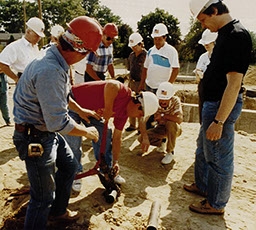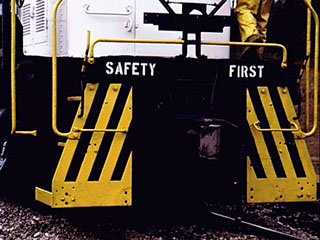THE CONSTRUCTION INDUSTRY
 The construction industry is a vital employer in the nation's economy and embraces hundreds of different types of activities, from the construction of hydroelectric dam and interstate highways to multi-story office buildings and large residential projects as well as major maintenance and alterations. Construction offers many different types of career paths, from semi-skilled and skilled craft careers covering over 20 different trades to jobs in management covering a wide scope of activities. The opportunities for advancement are virtually unlimited, regardless of where you choose to start.
The construction industry is a vital employer in the nation's economy and embraces hundreds of different types of activities, from the construction of hydroelectric dam and interstate highways to multi-story office buildings and large residential projects as well as major maintenance and alterations. Construction offers many different types of career paths, from semi-skilled and skilled craft careers covering over 20 different trades to jobs in management covering a wide scope of activities. The opportunities for advancement are virtually unlimited, regardless of where you choose to start.
The industry also offers national and international job market, giving you the opportunity to select an employer in any city or town anywhere in the world. Few other careers offer this type of opportunity. Who hires employees trained in the building trades or with degrees in construction science? Obviously, one answer would be general contractors and sub-contractors. These are the companies that do the greatest amount of new construction, rehabilitation, remodeling, and maintenance. Many men and women with construction backgrounds are hired by other companies and agencies to evaluate, plan and oversee construction performed for them, Prospective employers in this group include local, state and federal governments, hospitals, schools, and corporations that build and maintain ware houses, factories and offices.
to evaluate, plan and oversee construction performed for them, Prospective employers in this group include local, state and federal governments, hospitals, schools, and corporations that build and maintain ware houses, factories and offices.
CATEGORIES OF CONSTRUCTION
Contractors normally specialize ion one or more of the following types of construction.
General Building Construction:
Erecting office building, houses, apartments, plants, schools, hospitals, churches, government buildings...virtually every type of shelter needed by man.
Highway Construction:
Highways and the related facilities such as bridges, grade separations, culverts, paving, earthmoving, traffic controls and landscaping.
Heavy Construction:
Tunnels, airports, dams, military bases, railroads and flood control projects.
Utilities Construction:
Power plants, pipeline installations, sanitation projects, waterworks and transmission stations.
CAREER OPPORTUNITIES
 Career opportunities in construction are nearly unlimited. There are many different jobs for many different activities. Each job has its own advantages, responsibilities and rewards for those who are qualified. Salaries are flexible...they depend on the person; your abilities, effort, initiative and dedication are the deciding factors. Let's take a look at some of the many career positions available to you in the construction industry. Some are available to you after specialized training; others require a broad understanding of the total project, gained only after ears of preparation and experience. Remember, regardless of whichever career you'd like to follow, your success will depend on your abilities, your effort, your initiative and your dedication to the job.
Career opportunities in construction are nearly unlimited. There are many different jobs for many different activities. Each job has its own advantages, responsibilities and rewards for those who are qualified. Salaries are flexible...they depend on the person; your abilities, effort, initiative and dedication are the deciding factors. Let's take a look at some of the many career positions available to you in the construction industry. Some are available to you after specialized training; others require a broad understanding of the total project, gained only after ears of preparation and experience. Remember, regardless of whichever career you'd like to follow, your success will depend on your abilities, your effort, your initiative and your dedication to the job.
Also, remember there are many people in the construction industry who want to see you succeed and are willing to voluntarily give their support and experience in encouraging capable people to enter the construction industry.

Some typical progressions- Shown here are some career paths that are open to you in the construction industry. You get an idea of how members of the construction team move up in their jobs from the following common career progressions.
- High School Graduate, Apprentice, Journey person, Foreman, Superintendent, General Superintendent.
- Technical School Graduate, Assistant Expediter, Expediter Purchasing Agent, Vice President.
- Junior College Graduate, Assistant Engineer, Engineer, Job Superintendent, General Superintendent, Vice President.
- College Graduate, Junior Estimator, Estimator, Construction Engineer, Marketing Manager, Partner.
- College Graduate, Construction Engineer, Job Superintendent, General Superintendent Project Manager, President.
The following information gives you a little more detail on each type of job.
Journeyperson: carpenter, mason, operating engineer, etc., a member of one of the building trades who performs the work of a particular craft as directed by the foreman.
Foreman: supervises all journeymen of a particular trade working on a project. Plans work, maintains schedules, ensures procedures as directed by the superintendent.
Draftsman: prepares working plans, drawings and diagrams for engineering and construction purposes.
Construction Engineer: responsible for technical aspects of a project including the design, testing and analysis of specifications and materials, planning, surveying, research and other critical factors in the building process.
Safety Engineer: responsible for setting up job site safety operations, ensuring safety consciousness of employees, ensuring that activities are conducted in accordance with federal and state safety and health regulations and procedures, and provides professional advice on safety of various construction activities.
Estimator: prepares basic data concerning a proposed construction project (usually from plans and specifications) including quantities of materials, man-hours to perform items of work, methods to be used, equipment required, and with the assistance of other members of the office staff, computes the cost of construction which represents the contractors' competitive bid for the job.
Expediter: maintains construction schedules by reviewing deliveries, scheduling arrival of materials and men at job sites, establishing work priorities, and obtaining necessary clearances.
Purchasing Agent: determines most economical sources for materials, stores, supplies, equipment and parts. Ensures purchase at lowest price consistent with required delivery schedule.
Inspector: inspects the work of contractors to ensure that the requirements of the drawing, specifications and codes for the work are met.
Office Manager: performs or supervises the variety of support services required of a construction business, such as keeping books, preparing payroll, billing clients, and handling mail.
General Superintendent: directs all construction functions for large projects according to established schedules, specifications, methods, and procedures; supervises job superintendent on very large projects or on a variety of smaller projects.
Project Manager: directs all construction functions on very large projects; establishes and develops methods, procedures, schedules, and policies; coordinates the work of all units and divisions; performs such administrative duties as are required for proper completion of the project.
Contractor: often a company owner; a businessman and construction specialist in most cases; responsible for all construction activities; deals with all key individuals on a project…the architect, the owner, the subcontractors and company personnel.
BUILDING YOUR FUTURE
It's Your Job-How Far Can You Go? How far you go in this rapidly expanding industry depends not only on how well you prepare yourself for each job, but how well you do it. Responsibilities come early and with them, the chance to show what you can do, and the opportunity to advance toward your ultimate goal.
 People come into construction in various ways. Many enter through craft apprenticeship programs and become skilled trades people. Some start out in the contractor's offices as skilled technicians, engineers, accountants, secretaries, or in other positions. However, advancement in all cases after entering the industry depends on the efforts of the employee and the needs of the employer.
People come into construction in various ways. Many enter through craft apprenticeship programs and become skilled trades people. Some start out in the contractor's offices as skilled technicians, engineers, accountants, secretaries, or in other positions. However, advancement in all cases after entering the industry depends on the efforts of the employee and the needs of the employer.
 This booklet is designed to inform you about career opportunities in the construction industry and how to become a skilled journeyman through various crafts' apprenticeship programs.
This booklet is designed to inform you about career opportunities in the construction industry and how to become a skilled journeyman through various crafts' apprenticeship programs.
For those of you considering going on to college, reference material is also included in this booklet to guide you to programs available for training people to be estimators, job superintendents, project managers and engineers.
APPRENTICESHIP PROGRAMS
Apprenticeship is a combination of the on-the-job training and related classroom instruction in which workers learn the practical and theoretical aspects of a highly skilled occupation. Apprenticeship programs are operated on a voluntary basis by employers, employer associations or management and labor groups. The related classroom instruction is given in the program sponsor's training facility or a local technical school or junior college.
What is an Apprentice?
An apprentice is a worker who learns a craft skill through planned, supervised work on the job, plus related classroom instruction. Moreover, when working on the job, an apprentice is a regular part of the work force and earns wages while acquiring an important skill.
 The apprenticeship training period for skilled occupations ranges from three to six years. Apprentices are taught the proper use, care and safe handling of the tools and equipment used in connection with their work. To round out their training, classroom work is required in subjects related to the trade.
The apprenticeship training period for skilled occupations ranges from three to six years. Apprentices are taught the proper use, care and safe handling of the tools and equipment used in connection with their work. To round out their training, classroom work is required in subjects related to the trade.
Men and women 17 or 18 years old (depending on the trade) are eligible to apply. Applicants must be physically able to do work of the trade. Some trades require an entry examination. Most trades require applicants to be high school graduates or possess a General Education Development (GED) certificate. Apprenticeship programs provide equal employment opportunity to all persons, regardless of race, sex, ethnic group or age.
Most trades require applicants to be high school graduates or possess a General Education Development (GED) certificate. Apprenticeship programs provide equal employment opportunity to all persons, regardless of race, sex, ethnic group or age.
Equal opportunity in apprenticeship means that you will be considered for training without regard to:
- Your race or the color of your skin
- Your national origin
- Your religion or lack of religion
- Your sex
It also means equal treatment in pay, promotions, layoffs and evaluations.
Women are strongly encouraged to find out about the wide range of jobs that can be learned through apprenticeship.
Apprenticeship in the building trades offers women excellent opportunities for employment in jobs that are both personally satisfying and well paid. The apprenticeship system provides the opportunity for learning to become a highly skilled worker while receiving wages during the training period.
Apprentices Earn College Credit
Many apprenticeship programs now qualify for college credit.
Apprentices Get Regular Wage Increases
Apprentices can earn while learning; the more they learn, the higher the pay.  Most apprentices are paid 40% to 50% of a journeyperson's wage to start. As they climb the ladder to their final qualifications, their wages are increased at regular intervals. At the end of their term of apprenticeship, they become a journeyperson and draw full pay for their skill.
Most apprentices are paid 40% to 50% of a journeyperson's wage to start. As they climb the ladder to their final qualifications, their wages are increased at regular intervals. At the end of their term of apprenticeship, they become a journeyperson and draw full pay for their skill.
Training is Good Insurance
Training in the skilled construction trades is good insurance. In addition to opportunities for promotion and steady employment, it gives you something that no one can ever take away from you - a lifelong increased earning capacity that will enable you to get and keep a well-paying job anywhere in the country. Skilled hands and a trained mind give the owner a strong feeling of security which, in some ways, is better than money in the bank.
 A point of interest to those entering the construction industry: at times because of the nature of the industry, jobs may not be available all year. Factors such as the states of the economy, weather, work jurisdiction and your own ability can impact the number of hours you are employed in any given year.
A point of interest to those entering the construction industry: at times because of the nature of the industry, jobs may not be available all year. Factors such as the states of the economy, weather, work jurisdiction and your own ability can impact the number of hours you are employed in any given year.
Joint Apprenticeship Committees
The actual selection of apprentices in every skilled building trade is done by members of a Joint Apprenticeship Committee. These are people with considerable experience representing both management and labor. Committee members do all the selecting of applicants.
ALL ABOUT ADVANCEMENT
The Joint Apprenticeship Committee determines the needs for apprentices and sets the standards of education, experience and training. A high school education, or its equivalent, with courses in mathematics and science is very desirable. Often applicants are given tests by the Committee to determine their aptitude for a particular occupation. More specific requirements are described later in this section under each trade.
How to Prepare for Apprenticeship Training
Today, construction tradespeople are drawn from the ranks of high school graduates, college students, and college graduates. The importance of staying in school and learning all you can, cannot be overemphasized. The smart young person of today stays in school as long as possible. In the stiff competition of today's industry, a person must be able to do jobs requiring more than a few weeks' experience. A high school education is required preparation for a young person interested in becoming a skilled journeyman. The term is an old one, dating back to medieval times when skilled craftsmen had to travel from place to place to practice their trade. Thus, they became known as journeypersons. The word now refers to persons who have served their apprenticeship.
How to Enter Apprenticeship
The most common way that a young person can enter an apprenticeship program is through indenturing. Indenturing is basically a written agreement to train for a craft as a learner, or apprentice. Agreements generally are with the Joint Apprenticeship Committee for the full term of apprenticeship - from 3 to 5 years. An agreement can also be with an employer who can provide the variety of work experience necessary to give the apprentice all-around instruction in the craft and relatively continuous employment.
WHAT TYPE OF SALARIES ARE AVAILABLE IN CONSTRUCTION?
What can I earn?
What you will earn will depend on your individual circumstances. Currently the beginning Apprentice in a Building Trades Apprenticeship Program begins at 45% to 50% of the current Journeyman rate. That percentage goes up every year you are in the program, until you reach your Journeyman status.
What does that mean in dollars and cents – You earn while you learn-
Average Journeyman Rate of the 16 Trades in Michigan
$28.00 per hour - Base Rate @ 50% -- $ 14.00 - Per Hour
is an estimate of what you will earn during your first year
Fringe Benefits are over and above. They include, but are not limited to:
Insurance Pension Vacation Training Fund
When you complete a four or five-year apprenticeship program, your journeyman card takes you to 100% of the current wages. Your training is part of your apprenticeship, so unlike someone who has gone to a two or four-year college program, you won’t have a college loan to pay-off with your income.
Earning Potential in the Construction Industry
Wages in the Construction Industry vary. The following is an average representation of the earning potential of an individual entering into the Construction Industry:
- Beginning Apprentices earn $600 a week.
- They also get hospitalization insurance for their family, along with other fringe benefits.
- By the time they have completed a five-year Apprentice Program, they will have earned $200,000 and can anticipate earning from $60,000 to $70,000 as a journeyperson.
- After working 30 years they will have approximately one million dollars in pension.
Prepare For Your Career!
You now know what the “construction industry” is. You’ve learned about apprenticeship in the building trades. You’re thinking . . . “maybe I’d like a career in construction. But what can I do now to prepare for the future?”
Here are a few things you can do to prepare for your career.
- Stay in school and learn. The smart young person of today stays in school as long as possible.
- Work hard in school! A good work ethic is important when you are on the jobsite.
- Take classes that will really help you prepare – Math, Science, Technology Education, CAD, etc.
- Pay attention to the world around you! Learn about construction projects and building in your town or community.
- Talk to a building trades representative, contractor or tradesperson. Learn about different jobs in the industry.
Click Here to go back to Your Career